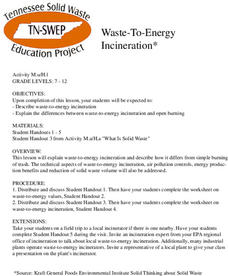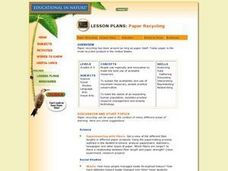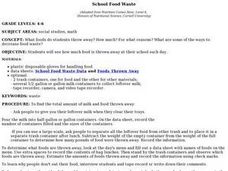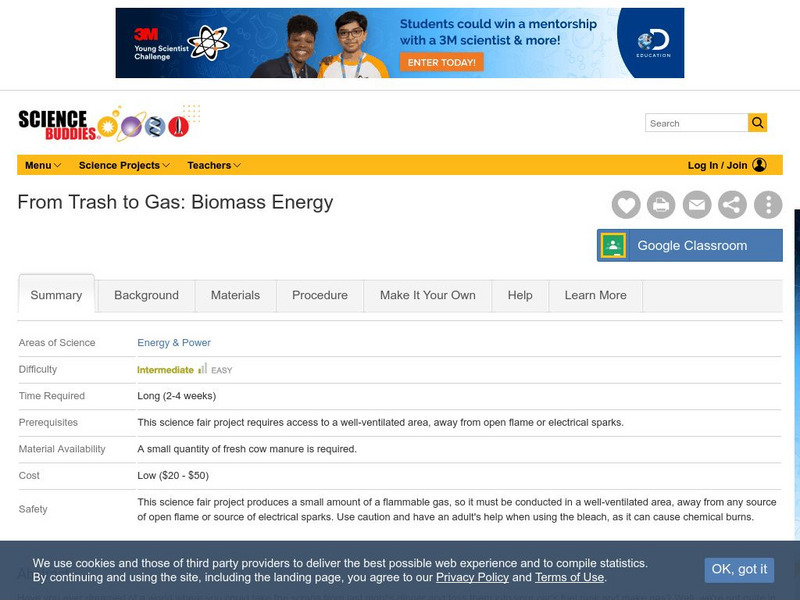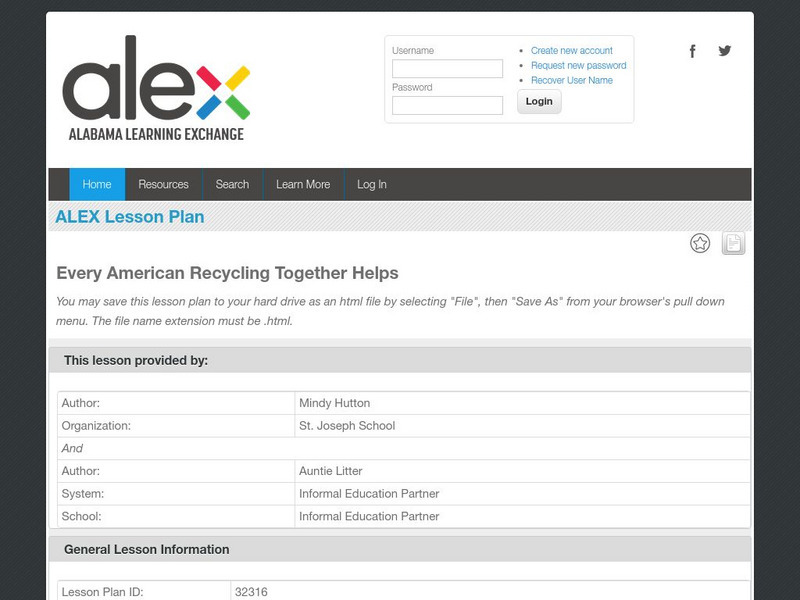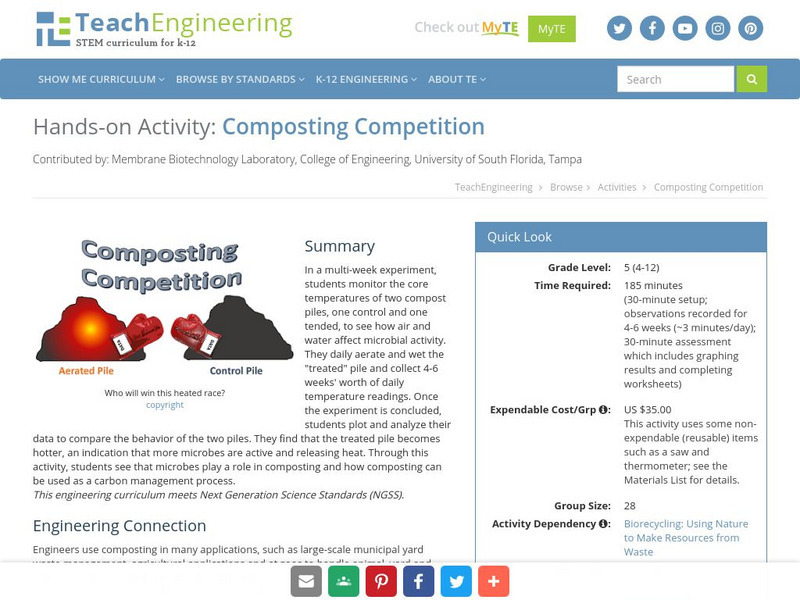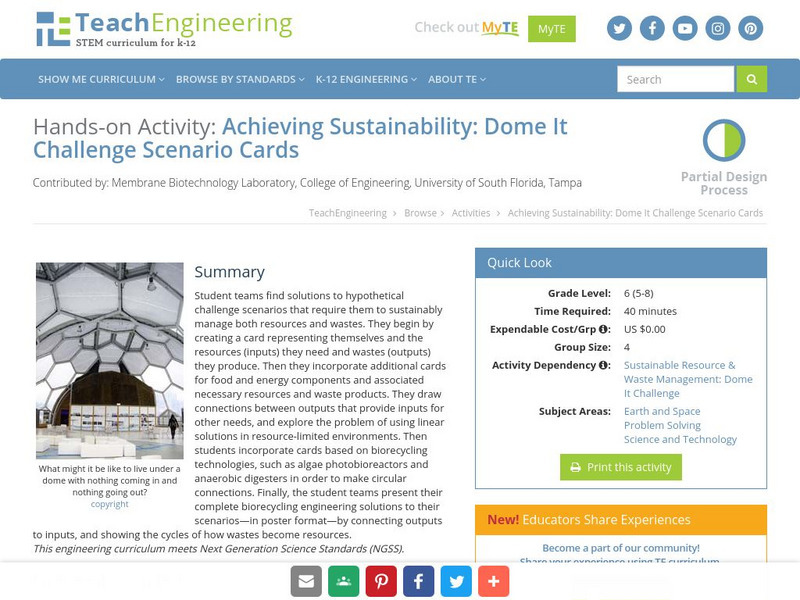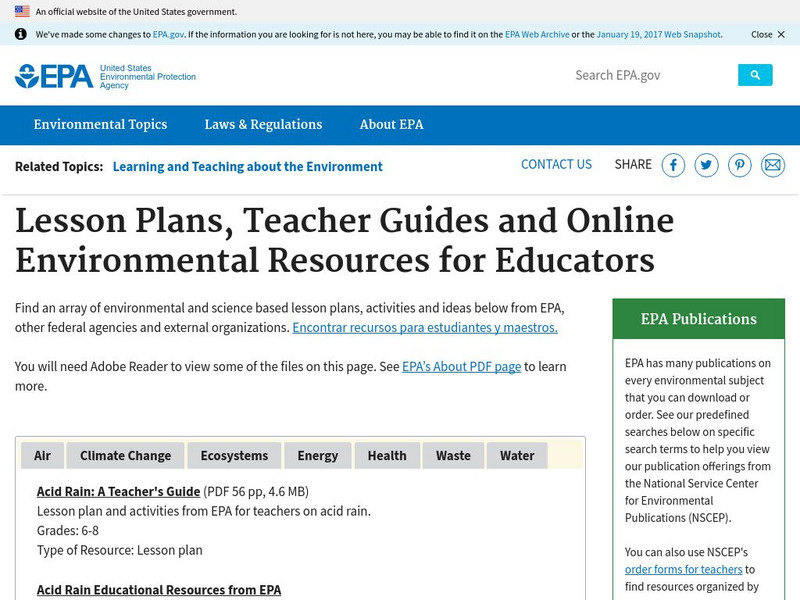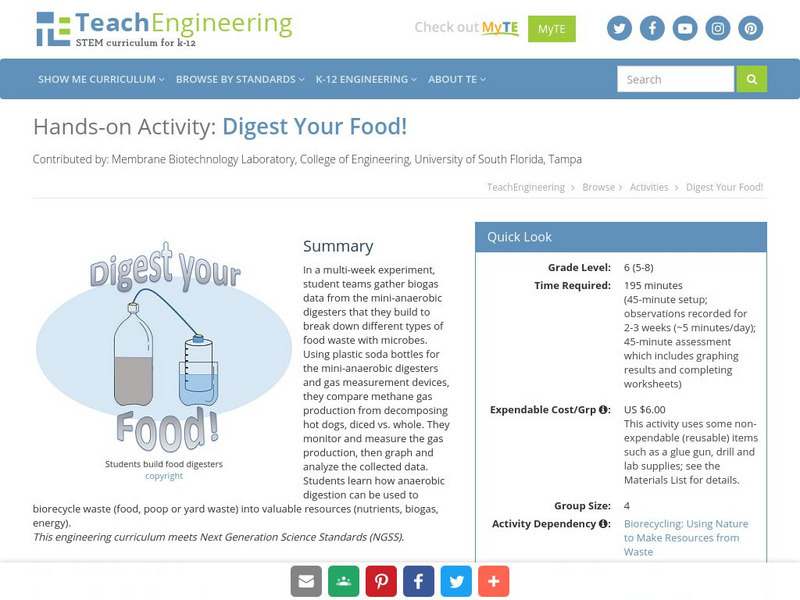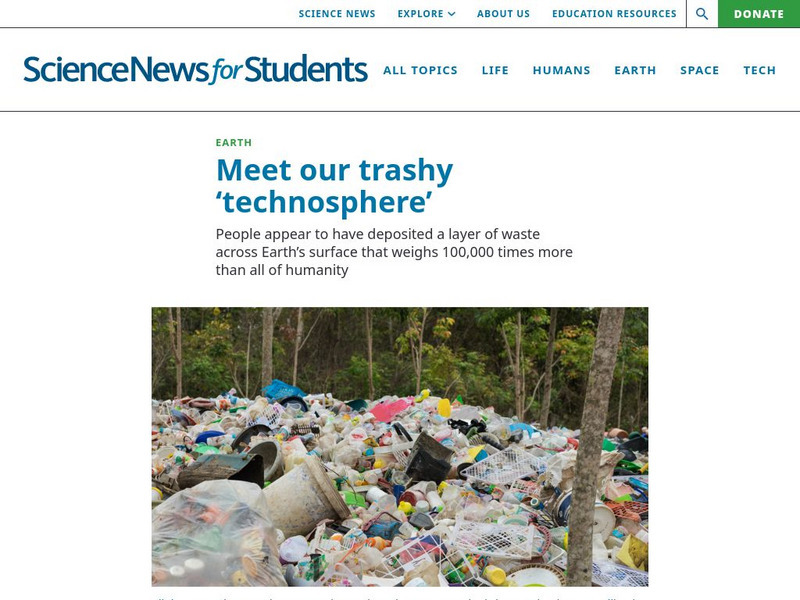Curated OER
Wasting Water
Students participate in a hands-on experiment to discover why it is important to conserve water and explore common ways water is wasted. Students estimate the volume of water available on earth and calculate the volumes and costs of...
Curated OER
Soild Waste and Recycling
In this unit of lessons, students examine solid waste and recycling. They discover the concept of decomposition. They also observe the decomposition process and make observatins.
Curated OER
MY REDUCE/REUSE STORY
Pupils go through old magazines and select pictures of things which ultimately become a waste product. They paste these pictures into a small "recycling" book. They dictate a story about reuse and/or recycling of these materials.
Curated OER
Waste-To-Energy Incineration
Students learn what waste-to-energy incineration is by working together to complete worksheets.
Curated OER
PAPER RECYCLING
Students examine the availability and use of important resources, people practice conservation. They explore the needs of an expanding human population, societies practice resource management and employ technology.
Curated OER
What Does Waste Do to a River?
Students develop a graphic way of visualizing the concept of a million by utilizing what had happened to the Nashua River due to the dumping of raw sewage in 1962.
Curated OER
Sludge
Young scholars become familiar with the idea that sludge is a waste product but can also be a resource, depending on its characteristics and how we manage it. They read information and answers questions on a worksheet imbedded in this plan.
Curated OER
School Food Waste
Learners see how much food is thrown away at their school each day. They utilize a survey form imbedded in this plan to organize their research. They use the information gathered to make some suggestions about how to decrease food waste...
Georgia Department of Education
Ga Virtual Learning: Biology: Cell Energetics
An interactive module where students describe, compare, contrast and explain the relationship between photosynthesis and cellular respiration.
Science Buddies
Science Buddies: From Trash to Gas: Biomass Energy
Have you ever dreamed of a world where you could take the scraps from last night's dinner and toss them into your car's fuel tank and make gas? Well, we're not quite in "Back to the Future" yet, but in this energy science fair project,...
Alabama Learning Exchange
Alex: Every American Recycling Together Helps
Lesson where young scholars learn about recycling by collecting trash from the schoolyard and watching a podcast about recycling. Additional activities are provided corresponding to different subject areas, such as reading, math, social...
DOGO Media
Dogo News: Week of 4 18 16: Edible Cutlery
Read about edible cutlery, and how it may help to reduce plastic waste. Includes video.
TeachEngineering
Teach Engineering: Design, Build and Test Your Own Landfill
Students design and build model landfills using materials similar to those used by engineers for full-scale landfills. Their completed small-size landfills are "rained" on and subjected to other erosion processes. The goal is to create...
TeachEngineering
Teach Engineering: Composting Competition
In a multi-week experiment, students monitor the core temperatures of two compost piles, one control and one tended, to see how air and water affect microbial activity.
TeachEngineering
Teach Engineering: Dome It Challenge Scenario Cards
Student teams find solutions to hypothetical challenge scenarios that require them to sustainably manage both resources and wastes.
TeachEngineering
Teach Engineering: Environment
Through 10 lessons and more than 20 hands-on activities, students are introduced to the concept of an environment and the many interactions within it. As they learn about natural and human-made environments, as well as renewable and...
TeachEngineering
Teach Engineering: What Will Biodegrade?
Students investigate what types of materials biodegrade in the soil, and learn what happens to their trash after they throw it away. The concepts of landfills and compost piles will be explained, and the students will have an opportunity...
TeachEngineering
Teach Engineering: Dome It Challenge
Young scholars brainstorm, identify, and explore the pathways where their food, water, and energy originate, and where wastewater and solid waste go. They learn that resources are interdependent and that recycling wastes into resources...
National Institutes of Health
Nih: Reduce, Reuse, Recycle
Reduce, Reuse, Recycle - Three great ways YOU can eliminate waste and protect your environment!Waste, and how we choose to handle it, affects our world's environment-that's YOUR environment. The environment is everything around you...
National Center for Families Learning
Ncfl: Wonderopolis: Why Does Food Rot?
Have you ever wondered why food rots? Watch a short video, read grade level text, and take an interactive quiz about the science behind spoiled food.
US Environmental Protection Agency
Epa: Lesson Plans, Teacher Guides and Online Resources for Educators
Find an array of environmental and science-based lesson plans, activities and ideas from the EPA, other federal agencies, and external organizations.
TeachEngineering
Teach Engineering: Digest Your Food!
In a multi-week experiment, student teams gather biogas data from the mini-anaerobic digesters that they build to break down different types of food waste with microbes. They compare methane gas production from decomposing hot dogs,...
Idaho State University
Idaho State University: Waste Management
Landfills are growing at exponential rates, air and water are filled with pollution, and many are trying to find ways to manage waste better to protect the land we live off. Take a look at this resource which explains and illustrates...
Society for Science and the Public
Science News for Students: Meet Our Trashy 'Technosphere'
People are creating a layer of debris and disturbance called the technosphere. A new study estimates just how truly massive it is.





